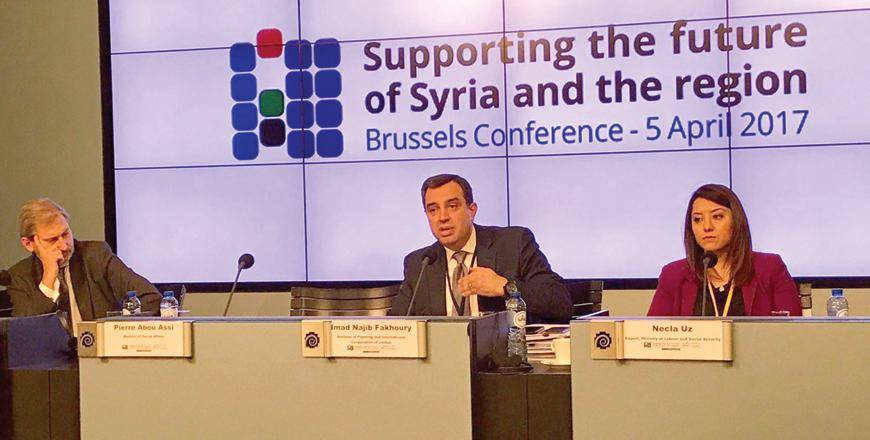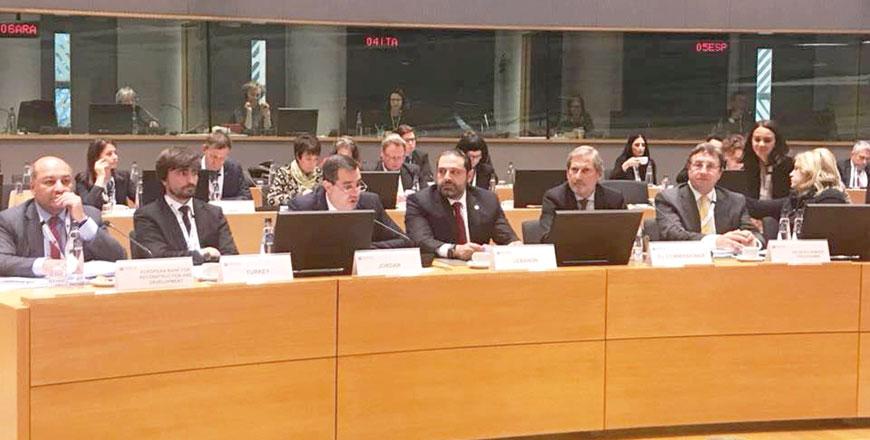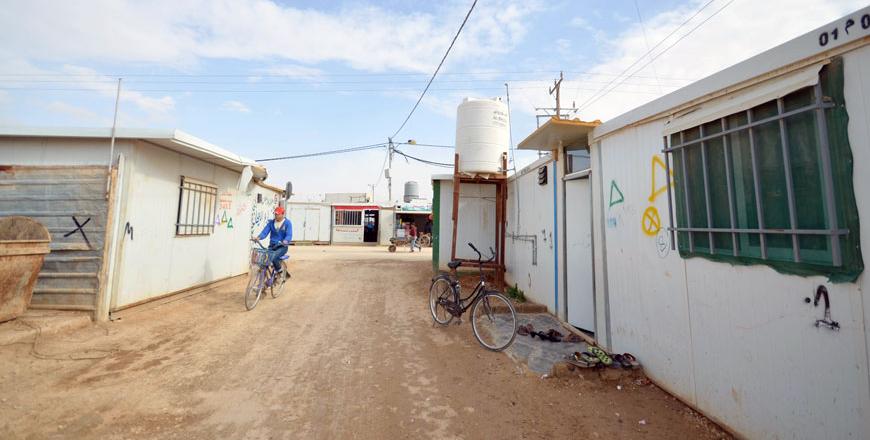You are here
Donors pledge around $40-billion aid to Syrian refugees’ hosts
By JT - Apr 08,2017 - Last updated at Apr 08,2017

Minister of Planning and International Cooperation Imad Fakhoury speaks during the international conference on Syria in Brussels, on Saturday(Photo courtesy of Ministry of Planning and International Cooperation)
AMMAN — The Brussels conference on Syria has approved aid worth $39,7 billion, including six grants, for Syrian refugees' host countries including Jordan, the Ministry of Planning and International Cooperation said on Saturday.
The conference was co-chaired by the UN, the EU, Germany, Kuwait, Norway, Qatar and the UK with the participation of 70 countries.
In a statement, Planning Minister Imad Fakhoury outlined the outcomes of the conference that was held Wednesday and Thursday to discuss the future of Syria, noting that the international community pledged to provide Syria's neighbouring countries with $6 billion as grants in 2017 and $3.7 billion for the years 2018 to 2020, in addition to $30 billion worth of loans, $2.3 billion of which is in the form of concessionary loans.
He said that participants issued the Jordan Document, which outlines the accomplishments of the London conference’s commitments, the progress achieved in the Jordan Compact, the document produced in London last year, as well as the goal to sustain international support.
Regarding financial commitments to Jordan received so far, Fakhoury said that they reached $2.55 billion as grants and concessionary funds in 2016, $1.63 billion as grants to support the Jordan Response Plan (JRP) in 2016, which amounts to 61 per cent of the estimated financial requirements. Another $6 million was announced as humanitarian aid, as well as $646.7 million to enhance host communities’ resilience, and $385 million to support the state budget.
The Jordan Document includes renewed commitment to agreements concluded in 2016 to be implemented in 2017, the minister said, adding that some $923.6 million has been made available as concessional loans, $834.6 million as support to the Treasury, and $89 million to finance development projects.
The document has also awarded Jordan the concessionary financing facility administered by the World Bank, worth $78 million as grants to improve the investment environment, generate jobs and upgrade infrastructure.
The document stipulates the conference’s co-chairs’ full commitment to these pledges, on the basis of the Jordan Compact, as well as their commitment to working collectively to prepare for the return of refugees to Syria.
The co-chairs reaffirmed their long-term political and financial support for Jordan, recognising the country’s contribution to the global “public good” and its efforts to transform the refugee challenge into a development opportunity, in accordance with the pledges listed in the Jordan Compact.
The organisers of the conference reiterated their solidarity with Jordan, expressing their keenness to broaden the donor base to include non-traditional donors. They highlighted the possibility to leverage existing mechanisms such as trust funds, including the EU Regional Credit Fund to respond to the Syrian crisis, and the efforts that can be made to increase concessional financing and overall financial assistance.
The EU’s external investment plan, the World Bank’s concessional financing mechanism were listed as available means of financing, with co-financing to be provided under these mechanisms. However, organisers stressed that grants remain the preferable option.
The organisers also stressed the Brussels conference’s innovative nature as it is the first of its kind in a series of events to be held in 2017. These include spring and annual meetings of the World Bank/International Monetary Fund (IMF), the World Economic Forum for the Middle East North Africa, the G-7, the G-20 and the UN General Assembly.
The Jordan Document also called for the provision of additional resources, including grants, Treasury support and concessional financing, in accordance with the Jordan Compact and the IMF’s recommendations to assist Jordan in dealing with the annual funding gap.
This includes supporting the Kingdom through the Concessional Financing Facility (CFF), providing technical support to Jordan as it benefits from the simplification of rules of origin agreement with the EU, and help it attract more investments to the Kingdom’s 18 development zones designated as beneficiaries from the said deal.
Participants also called for the recognition of Jordan and neighbouring countries as key actors in the rebuilding Syria efforts once a serious, credible process of political transition in Syria is reached.
Under the Jordan Document, donors committed to supporting programmes that stimulate overall economic growth through technical assistance to expand investment, promote exports and public-private partnerships with the aim of improving the infrastructure and executing economic growth programmes.
The document includes programmes aimed at creating jobs for women and the youth, harmonising skills, technical and vocational training for Syrian host communities and refugees, to enable them to contribute to their country’s reconstruction upon their return.
The plan to “accelerate access to quality formal education” for the next three years will continue to be supported in accordance with the Jordan Compact. It will be expanded through programmes removing barriers that hinder refugee children’s enrolment in formal education. This includes supporting operational expenses and infrastructure, such as the rehabilitation and/or construction of public schools.
The Jordan Document seeks to provide additional financial and technical support for the implementation of the Jordan Human Resources Development Strategy, based on a comprehensive government action plan and performance management framework.
The document also stresses the need to expand national capabilities to implement subsidy projects, continue to maximise monetary assistance and purchase national goods and services in order to add value to the Jordanian economy.
Fakhoury noted that host countries are in fact the biggest donors of aid, considering the burdens they shoulder, and the services they present to refugees.
When allocating assistance, the minister highlighted the importance of determining a host country’s capability, the previous refugee influx it has received, the volume of its economy and the refugee ratio to the population and the natural and financial resources.
Jordan faces bigger burdens and needs more support when considering these factors, he stressed.
Related Articles
AMMAN — Jordan on Thursday secured around $1.7 billion in grants and grant equivalents for its Syrian refugee response plan for this year an
AMMAN — The second Brussels conference on "Supporting the Future of Syria and the Region" has issued a partnership document between Jordan a
AMMAN — Leaders of two influential world organisations are due in Jordan before the end of this month to communicate the international commu













